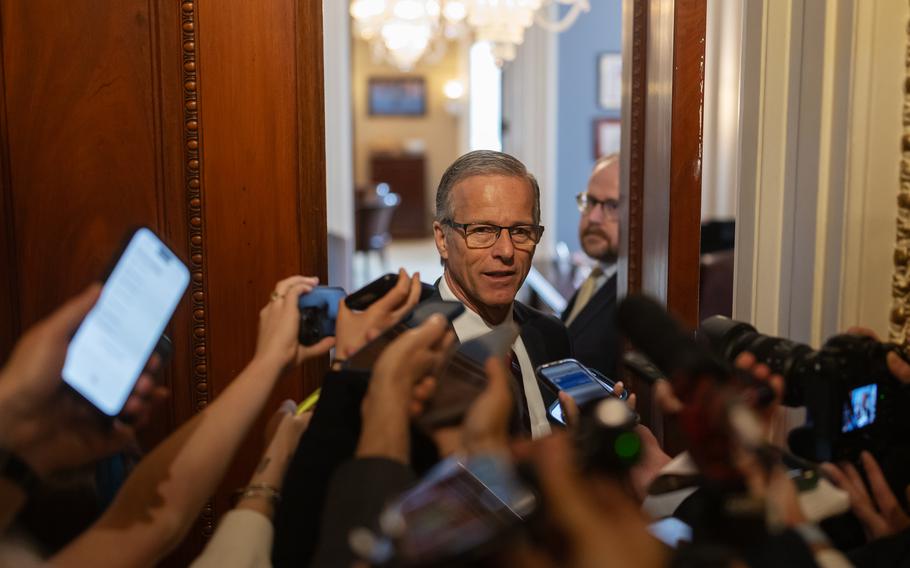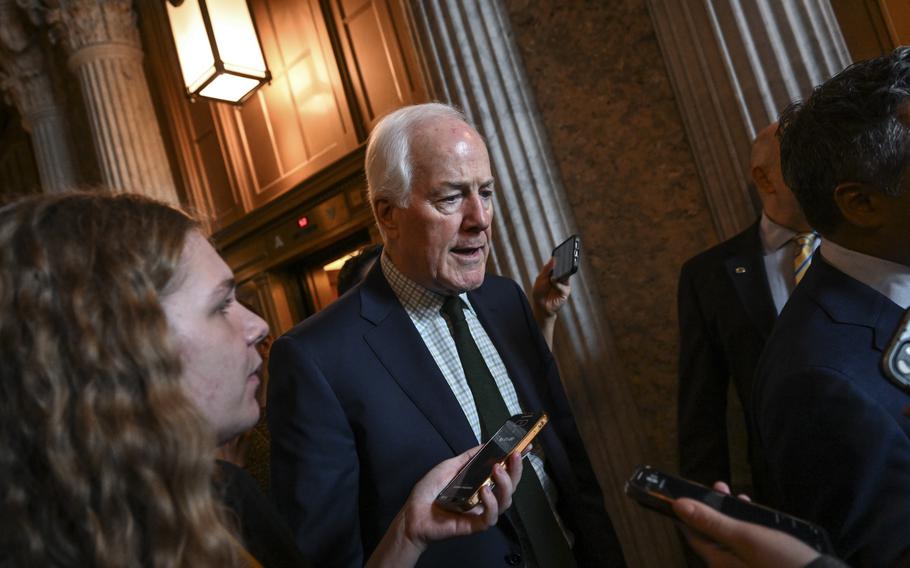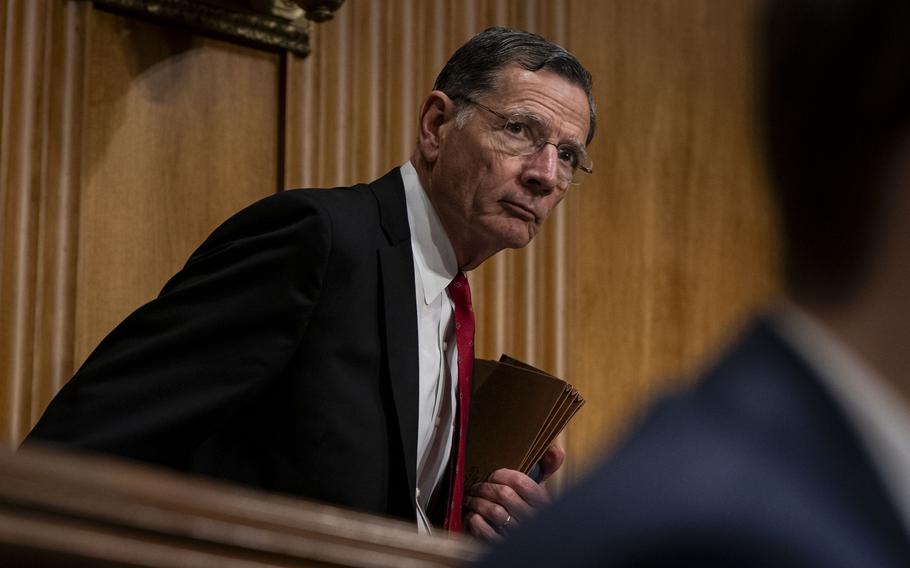Senate Minority Leader Mitch McConnell speaks at a conference in Washington, D.C., on Oct. 17, 2023. (Tia Dufour/U.S. Department of Homeland Security)
Immediately after Senate Minority Leader Mitch McConnell (R-Ky.) announced that he will step down from his leadership position in November, all eyes turned to a handful of Republican senators who could seek to succeed McConnell as their party’s leader in the chamber.
“I have full confidence in my conference to choose my replacement and lead our country forward,” McConnell, the longest-serving Senate leader in history, said during his announcement on the Senate floor.
Although no one has officially announced a bid to replace McConnell, a handful of lawmakers are widely seen as potential successors. Coincidentally, the three most likely successors are all named John.
Here’s a list of who could succeed McConnell:
Sen. John Thune (S.D.)
Senate Minority Whip John Thune (S.D.) is the No. 2 Republican in the Senate and one of McConnell’s closest allies. Thune has been in the Senate since 2005, rising through the party’s leadership ranks. Before that, he served in the House for six years. As minority whip, Thune serves as McConnell’s deputy, and it is his job to manage the logistics and math behind the whipping of votes across the conference.
Thune, 63, first joined the Senate GOP leadership in 2006 after then-Senate Republican Whip Trent Lott (Miss.) picked him as chief deputy whip. Thune went on to serve as vice-chair of the Senate Republican Conference before becoming the chairman of the Republican Policy Committee, the No. 4 GOP position in the Senate.
He became the chairman of the Republican Conference in 2012, making him the third-most powerful Republican in the Senate - and the highest-ranking Republican senator in his home state’s history. By 2019, he was the Senate majority whip, a position he held until 2021, when Democrats took the Senate.
Thune also served as chairman of the Senate Commerce Committee for four years until 2019.

Sen. John Thune (R-S.D.) speaks to reporters after the announcement by Senate Minority Leader Mitch McConnell (R-Ky.) on Wednesday. (Craig Hudson/The Washington Post)
After McConnell announced he was stepping away from leadership, reporters flocked to Thune’s office, which sits steps from the Senate floor. There, he said McConnell “leaves really big shoes to fill” but declined to say whether he would run to replace him.
Thune endorsed former president Donald Trump’s White House bid on Sunday, despite a rift between the two. Trump became highly critical of Thune - and even called for him to be primaried - after Thune and McConnell refused to help Trump overturn the results of the 2020 election.
Thune cannot run again for whip because of term limits.
Sen. John Cornyn (Tex.)
Sen. John Cornyn (Tex.), 72, served as minority and majority whip before Thune. He was forced to leave the position in 2019 because he was term-limited. Cornyn, who joined the Senate in 2002, is also widely seen as one of McConnell’s closest collaborators.
Cornyn came to the Senate after serving as Texas attorney general for almost four years. A lawyer, he has also previously served as an associate justice on the Texas Supreme Court and as a Texas judicial district court judge.
He has easily won reelection in Texas throughout his Senate career and was last reelected in 2020. Although Cornyn has not been as critical of Trump as Thune and McConnell - he endorsed the former president’s 2024 White House bid in January, despite initially saying he doesn’t believe Trump could win another term - he did not support Trump’s efforts to overturn the 2020 election.
In 2009, Cornyn became the chair of the National Republican Senatorial Committee, a position he held until 2013, when he became Senate minority whip. He has also chaired the Senate Narcotics Caucus.
In 2022, Cornyn led Republican negotiations for a bipartisan gun-control measure - one of the largest pieces of gun-control legislation passed in recent history - in a process that demonstrated his standing in the Senate GOP but also went against the grain of a conference that largely supports gun rights.
On Wednesday, in the wake of McConnell’s news, Cornyn signaled to reporters that he is interested in succeeding his longtime ally.
“Today is about Mitch McConnell,” he said. “But I’ve made no secret of my intentions.”

Sen. John Cornyn (R-Tex.) talks to reporters following a procedural vote this month. (Ricky Carioti/The Washington Post)
Sen. John Barrasso (Wyo.)
Sen. John Barrasso (Wyo.), the third-ranking Senate Republican and chair of the Senate Republican Conference, is probably the most conservative person named John on this list.
Barrasso also has a close relationship with McConnell. And while he, like other top Republican senators, did not support Trump’s efforts to overturn the 2020 election, he was less critical of them. He was among the first top Senate Republicans to support Trump’s 2024 presidential bid.
Barrasso, 71, has served in the Senate since 2007 after serving in the Wyoming Senate for four years. An orthopedic doctor by training, Barrasso was appointed to the Senate after the death of Sen. Craig L. Thomas. He was elected to finish Thomas’s term in 2008 and has won reelection ever since.
Barrasso has previously served as chair of the Senate Republican Policy Committee, a post he left in 2019 to become conference chair. If he were not to succeed McConnell, he could run for Republican whip, succeeding term-limited Thune.
When asked Wednesday about whether he will make a bid for the top Senate GOP role, Barrasso said he’s more focused on the November election.
“That’s the election we need to take the presidency and the Senate and the House, and that’s where my focus is,” he said.

Sen. John Barrasso arrives as the Senate Foreign Relations Committee holds hearings in November on U.S. national security interests in Ukraine. (Haiyun Jiang/The Washington Post)
Other potential options
While the three Johns are widely considered to be the most likely McConnell successors, Sens. Shelley Moore Capito (W.Va.), Steve Daines (Mont.) and Rick Scott (Fla.) also have been floated as potential candidates. Sen. Joni Ernst (Iowa), the chair of the Senate Republican Policy Committee and the No. 4 Republican in the conference, signaled on Wednesday that she is not interested in the job.
Moore Capito, vice chair of the Senate Republican Conference, and Daines, chair of the National Republican Senatorial Committee, are the No. 5 and No. 6 Republicans in the Senate, respectively. They have not signaled whether they will mount bids for McConnell’s job, but the two, like Ernst, are likely to go up the Republican leadership ranks after McConnell’s departure. On Wednesday, in the aftermath of McConnell’s announcement, Sen. Josh Hawley (R-Mo.) floated Daines as a possible McConnell replacement.
Scott, meanwhile, challenged McConnell for the top leadership position in 2022 after a disappointing midterm performance by Republicans. McConnell was reelected to the job in a 37-10 vote. Scott - who served as National Republican Senatorial Committee chair from 2021 to 2023 - has remained a top critic of the Kentucky Republican.
On Wednesday, he wouldn’t say whether he’ll again run for Republican leader, saying he’s choosing to focus on his own reelection in November. But he added that he has made it “very clear and have long believed that we need new leadership in the Senate.”
Liz Goodwin, Jacob Bogage and Marianna Sotomayor contributed to this report.